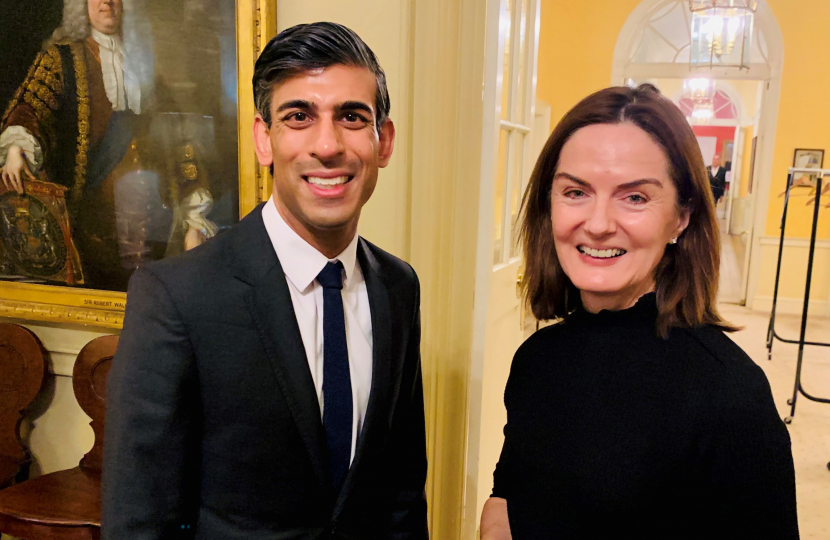
Since the Prime Minister took office in October last year, the Government has been working to deliver on the 2019 manifesto and the Prime Minister’s five priorities:
- Cut Inflation
- Grow the Economy
- Reduce National Debt
- Reduce NHS Waiting Lists
- Stop illegal crossings
Lucy was proud to stand on the 2019 manifesto, which gave a mandate for significant change and reform and saw Telford vote Conservative in larger numbers than ever before. You can read a breakdown of the Government’s record below:
Crime
- Record number of police officers by achieving our manifesto commitment of recruiting 20,000 more police officers, meaning there are now over 149,500 officers in forces across England and Wales - the highest number on record.
- Passing the Public Order Bill meaning Just Stop Oil protests are now broken up in under 10 minutes. On Monday 183 were protestors removed, and 21 arrested, as their plan to bring Parliament Square to a standstill was thwarted.
- Crime is falling - since 2010 overall crime (excluding fraud and computer misuse) has fallen by 54%. Neighbourhood crime including thefts, robberies and burglaries is also down 51%, as well as violent crime falling by 41%.
Public Services
- Tough Minimum Safety Levels are now law. The public rightly expect essential services to be there when they need them – whether that’s getting the train to work or knowing that you can call an ambulance in times of emergency – despite Labour’s consistent opposition.
- The NHS’s first ever long-term workforce plan in its 75-year history. Under the fully costed plan we will train more doctors, doubling the number of GPs, and increase the number of nurses in training, which will deliver 24,000 nurses a year. This will put the NHS on a footing to tackle the next 75 years and end the absurdity of having to either rely on expensive agency staff or importing tens of thousands of doctors and nurses.
- Scrapped the pension pot tax meaning that people like NHS consultants have generous pension schemes, helping to keep experienced doctors in the workforce.
Education
- Our children are now the best readers in the western world. Thanks to our high school standards, 88% of schools are now good or outstanding, up 18% since 2010. Our children have also risen nine places in the global league tables for maths and reading - making them the best readers in the western world.
- Expanding childcare by doubling the current entitlement meaning working parents will be able to access 30 hours of free childcare a week for 38 weeks a year, from when their child is nine months to when they start school, helping parents back into work.
- Clamping down on rip off degree courses that have high drop-out rates, don’t lead to good jobs and leave young people with poor pay and high debts. These changes will make sure the system is not just fair for students, but it’s also fair for taxpayers footing the bill.
The Economy & Cost of Living Crisis
- Expanding our long-term energy security with more oil, gas, and small nuclear reactors. Putin’s weaponisation of energy has amplified the need for energy security, which is why we launched a new licensing round for the North Sea. This comes alongside our massive investments in renewables and the launch of Great British Nuclear, with the goal of providing a quarter of future UK power needs from nuclear energy.
- Expanding our long-term energy security with more oil, gas, and small nuclear reactors. Putin’s weaponisation of energy has amplified the need for energy security, which is why we launched a new licensing round for the North Sea. This comes alongside our massive investments in renewables and the launch of Great British Nuclear, with the goal of providing a quarter of future UK power needs from nuclear energy.
- Tightening up the welfare system, getting people back into work. We have expanded the Midlife MOT and launched Returnerships, giving people the skills and support they need to enable more people to get back into the workforce, building on our strong record of 1 million fewer workless households since 2010.
- Using Brexit freedoms to make our financial services, life sciences and technology sectors more competitive. With our new freedoms we are reforming Solvency II, set to unlock over £100 billion of investment, and changing life sciences and medicines regulation, moving to a new model of medicines approval granting automatic sign-off for medicines and technology already approved by trusted regulators in the US, Europe and Japan.
- Bringing in foreign investment. We brought back £18 billion of investment from Japan, £14 billion from the US and just this week Tata has announced the biggest ever investment in British car manufacturing with £4 billion to build a battery plant, choosing the UK over the EU and creating thousands of jobs.
- We’ve joined CPTPP as the first European member, making us a member of an £11 trillion trade pact with the fastest growing region in the word. This deal will slash red tape with 99 percent of UK goods exports to CPTPP countries eligible for zero tariffs.
Britain’s place in the world
- Leading the world supporting Ukraine. We, and our allies, are steadfast in our resolve to support Ukraine, not just in the here and now, but for the long term as well. We are ensuring Ukraine receives the military support it needs to regain its territory. Over the past months we have given Ukraine a squadron of main battle tanks, further armoured vehicles and artillery guns, thousands of air defence systems, long range Storm Shadow missiles and are training of thousands of Ukrainian soldiers here in the UK.
- Signed the Atlantic Declaration with the US creating a new economic partnership, and the deepest level of economic cooperation either the UK or US have ever had, building on our already strong trading relationship worth £279 billion a year.
- Secured the Windsor Framework – resolving the problems with the Northern Ireland protocol.

